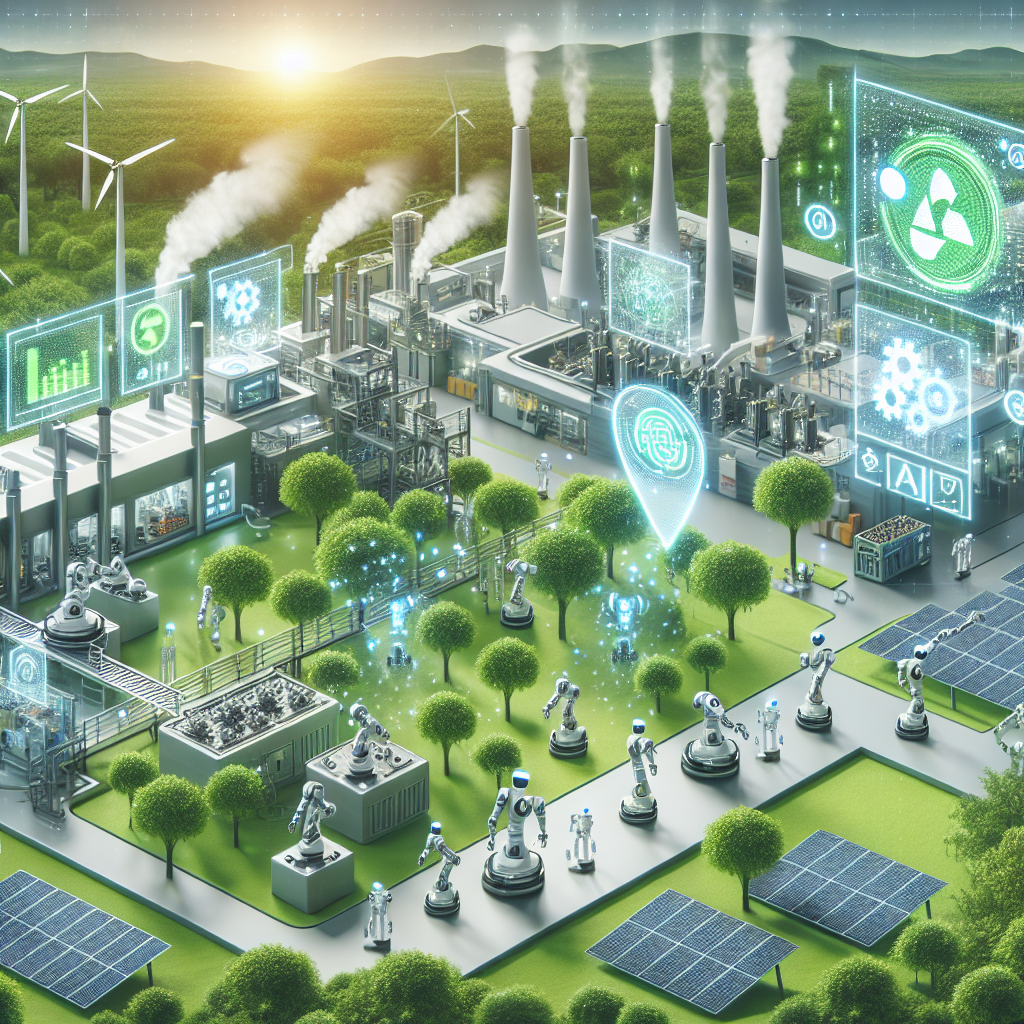Artificial intelligence (AI) has been revolutionizing various industries, and sustainable manufacturing is no exception. The integration of AI technologies in the manufacturing process has led to significant improvements in efficiency, productivity, and environmental sustainability. In this article, we will explore the benefits of AI in sustainable manufacturing practices and how it is shaping the future of the industry.
1. Improved Energy Efficiency
One of the key benefits of AI in sustainable manufacturing practices is improved energy efficiency. By analyzing vast amounts of data in real-time, AI systems can optimize energy consumption and reduce waste. For example, AI-powered predictive maintenance can identify potential equipment failures before they occur, preventing costly downtime and reducing energy consumption. Additionally, AI algorithms can optimize production schedules to minimize energy usage during peak hours, leading to significant cost savings and environmental benefits.
2. Waste Reduction
AI technologies can also help manufacturers reduce waste and improve resource efficiency. By analyzing production data and identifying inefficiencies in the manufacturing process, AI systems can suggest ways to optimize production and minimize waste generation. For example, AI-powered quality control systems can detect defects in real-time and automatically adjust production parameters to reduce waste. This not only improves product quality but also reduces the environmental impact of manufacturing operations.
3. Enhanced Productivity
AI can significantly enhance productivity in manufacturing by automating repetitive tasks and optimizing production processes. For example, AI-powered robots can perform complex tasks with precision and speed, leading to increased production output and efficiency. AI systems can also analyze production data to identify bottlenecks and inefficiencies in the manufacturing process, allowing manufacturers to make data-driven decisions to improve productivity.
4. Sustainable Supply Chain Management
AI technologies can also improve sustainability in manufacturing by optimizing supply chain management. By analyzing data on suppliers, transportation routes, and inventory levels, AI systems can help manufacturers identify opportunities to reduce carbon emissions, minimize waste, and improve overall sustainability. For example, AI-powered supply chain optimization tools can suggest alternative suppliers that are closer in proximity, reducing transportation costs and emissions. This not only improves sustainability but also reduces costs for manufacturers.
5. Improved Safety
AI technologies can also enhance safety in manufacturing operations by predicting and preventing accidents before they occur. For example, AI-powered predictive maintenance systems can identify potential equipment failures that could pose safety risks to workers. By addressing these issues proactively, manufacturers can create a safer working environment for their employees and reduce the likelihood of accidents.
6. Regulatory Compliance
AI technologies can help manufacturers stay compliant with environmental regulations and standards by monitoring and analyzing data on emissions, waste generation, and other environmental impacts. By providing real-time insights into environmental performance, AI systems can help manufacturers identify areas of non-compliance and take corrective actions to meet regulatory requirements. This not only reduces the risk of fines and penalties but also enhances the reputation of the company as a responsible and sustainable manufacturer.
7. Customer Satisfaction
In an increasingly environmentally conscious market, customers are demanding products that are produced sustainably and ethically. By integrating AI technologies in manufacturing processes, companies can improve their sustainability credentials and meet the expectations of environmentally conscious consumers. AI-powered quality control systems can ensure that products meet strict environmental standards, while AI-powered supply chain management tools can track the environmental impact of products throughout their lifecycle. This not only enhances customer satisfaction but also creates a competitive advantage for manufacturers in the market.
In conclusion, the benefits of AI in sustainable manufacturing practices are vast and far-reaching. From improved energy efficiency and waste reduction to enhanced productivity and safety, AI technologies are transforming the manufacturing industry and shaping a more sustainable future. By leveraging the power of AI, manufacturers can reduce their environmental footprint, improve operational efficiency, and meet the growing demands for sustainable products. As the technology continues to evolve, the possibilities for AI in sustainable manufacturing are endless, and the potential for positive impact on the environment and society is immense.
FAQs:
1. What are some examples of AI technologies used in sustainable manufacturing?
Some examples of AI technologies used in sustainable manufacturing include predictive maintenance systems, quality control systems, supply chain optimization tools, and production scheduling algorithms. These technologies help manufacturers optimize energy consumption, reduce waste, improve productivity, enhance safety, and ensure regulatory compliance.
2. How can AI help manufacturers reduce waste in the production process?
AI technologies can help manufacturers reduce waste in the production process by analyzing data on production processes, identifying inefficiencies, and suggesting ways to optimize production. For example, AI-powered quality control systems can detect defects in real-time and adjust production parameters to reduce waste. AI algorithms can also optimize production schedules to minimize waste generation and improve resource efficiency.
3. How can AI improve energy efficiency in manufacturing operations?
AI technologies can improve energy efficiency in manufacturing operations by analyzing data on energy consumption, identifying opportunities for optimization, and suggesting ways to reduce energy usage. For example, AI-powered predictive maintenance systems can identify potential equipment failures that could lead to increased energy consumption. AI algorithms can also optimize production schedules to minimize energy usage during peak hours and reduce costs.
4. How can AI enhance safety in manufacturing operations?
AI technologies can enhance safety in manufacturing operations by predicting and preventing accidents before they occur. For example, AI-powered predictive maintenance systems can identify potential equipment failures that could pose safety risks to workers. By addressing these issues proactively, manufacturers can create a safer working environment for their employees and reduce the likelihood of accidents.
5. How can AI help manufacturers stay compliant with environmental regulations?
AI technologies can help manufacturers stay compliant with environmental regulations by monitoring and analyzing data on emissions, waste generation, and other environmental impacts. By providing real-time insights into environmental performance, AI systems can help manufacturers identify areas of non-compliance and take corrective actions to meet regulatory requirements. This not only reduces the risk of fines and penalties but also enhances the reputation of the company as a responsible and sustainable manufacturer.

